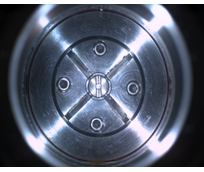Many important industrial processes, including oil and gas production, underground CO2 sequestration, and various applications of supercritical fluids, happen at elevated pressures. Better design and optimization of these processes require critical experimental data, accurate models and efficient algorithms in phase equilibrium and fluid properties. Our research attempts to cover these three aspects in an integrated manner. A major focus of our research is oil and gas production while our expertise and the general tools developed are applicable to a much wider range where phase equilibrium and thermal physical properties are crucial, such as production of bulk and special chemicals, geological processes, supercritical fluid based technologies, and biotechnological areas.
Experimental study of high-pressure phase behavior: Our laboratory is equipped with state-of-the-art facilities for analyzing petroleum fluid composition, preparing high-pressure fluid samples, and conducting systematic phase behavior study of reservoir fluids or multicomponent mixtures. We can perform petroleum characterization using simulated distillation and true boiling point distillation. Most high-pressure facilities can operate up to 200 oC and 1500 bar. The high-pressure lab allows measurement of phase equilibrium including saturation points, organic deposits (wax and asphaltene), and various thermophysical properties (density, viscosity, and heat capacity).
High-pressure PVT system:

Schematic of the high-pressure PVT system:

Observed phase transitions (bubble point and cloud point)


Modeling of complex phase equilibrium: For complex mixtures and systems at extreme conditions, accurate description of phase equilibrium often require application of advanced thermodynamic models or further improvement of the modeling approach. Typical examples include high-pressure high-temperature reservoir fluids, steam/heavy oil/solvents systems, hydrocarbon mixtures in confined spaces.
Petroleum fluid characterization and application to HPHT reservoirs:

Phase equilibrium modeling in the presence of capillary pressure and adsorption for production from shale reservoirs:

Phase equilibrium calculation algorithms: Efficient and robust equilibrium calculation algorithms are indispensable to compositional simulations. We work on various phase equilibrium calculations in particular different flash-type problems. For instance, we work on multiphase isothermal flash, multiphase isenthalpic flash and other flash specifications. A recent focus is modified RAND and its variations, which can be applied to simultaneous chemical and phase equilibrium calculation and various flash specifications.
Classical or RAND-based flash with various specifications that can handle multiple phases:

Modified RAND for multiphase reaction equilibrium (applicable to reactive distillation, heterogeneous catalysis, biofuel production and description of geochemical processes):

Oil production and underground CO2 storage: A strategic research area is petroleum production and underground CO2 storage. The two issues concern energy security and CO2 emission reduction, respectively, but they are also interrelated since both handle large scale underground processes. We are particularly interested in gas injection and other solvent injection technologies, development of challenging resources such as shale and HPHT reservoirs, and CO2 sequestration through EOR or in aquifers. We work on PVT experiment and modeling, reservoir simulation as well as flooding experiments.
Compositional reservoir simulation involving complex phase equilibrium:
